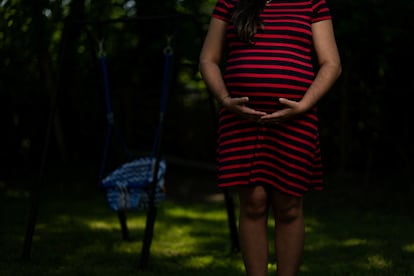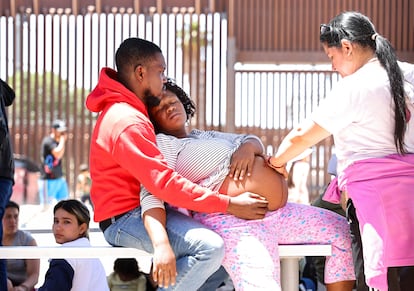Trump’s decree-ordered end to birthright citizenship reaches Supreme Court
The court is holding a hearing to decide whether the rulings of judges who blocked the presidential order have national scope or not


The United States Supreme Court is holding a hearing Thursday to address what is likely the biggest controversy sparked by Donald Trump’s executive orders: the right to birthright citizenship. On his first day as president, the Republican ordered the elimination of the right to citizenship for children born in the United States to undocumented immigrant parents, a guarantee enshrined in the Constitution since 1868. The Supreme Court does not have to rule directly on whether Trump’s decree is constitutional or not, but will decide whether the three court rulings that deemed the executive order unlawful can be applied to the entire country.
The Trump administration asked the Supreme Court to address the issue urgently after federal judges in Maryland, Massachusetts, and Washington blocked the order, ruling that the president cannot change or limit the Constitution by executive order.
The administration is asking judges to limit the application of court rulings to the parties who filed the lawsuit, arguing that lower courts cannot issue rulings that block a national presidential order. The administration asserts that federal judges can only rule on the rights of the litigants in the case before them. They assert that this remedy has been used by the courts at “epidemic proportions” since the start of Trump’s second administration, preventing the executive branch from “exercising its constitutional functions.”
The plaintiffs argue that there’s no reason for the Supreme Court to rule on whether universal injunctions are always appropriate. What’s relevant, they say, is to define whether such rulings are appropriate in this case.
It is unclear when the Supreme Court will make a decision, although it is likely to do so before the summer recess, which typically begins in late June.
Although not the subject of the hearing, the court’s decision will determine whether the Constitution grants citizenship to all those born in the United States. If the Supreme Court rules in favor of Trump, restrictions on birthright citizenship could go into effect in at least 27 states.
The parties differ on the interpretation of the Fourteenth Amendment, which specifies: “All persons born or naturalized in the United States, and subject to the jurisdiction thereof, are citizens of the United States and of the State wherein they reside.” That guarantee, established in 1868, has traditionally only excluded the children of foreign diplomats and the children of alien enemies during a hostile occupation.
Trump argues, however, that the phrase “subject to the jurisdiction” excludes the children of undocumented immigrants. The president argues that children born in the United States to non-citizens owe loyalty to another country.
The first judge to rule was Maryland’s John Coughenour, who called the executive order “blatantly unconstitutional.”

Massive opposition
Trump fulfilled his campaign promise and, on the day of his second inauguration, signed the executive order stripping citizenship rights from children whose parents lack permanent legal status. The president and his supporters argue that stricter standards for becoming a U.S. citizen should exist, calling the executive order “a priceless and profound gift.”
The reactions were swift. It took only minutes for the American Civil Liberties Union (ACLU) to file the first lawsuit. Several states, civil society organizations, and pregnant women have challenged the order in 10 separate lawsuits. Despite Trump’s repeated declarations that he would do so, legal experts doubted that the president would dare challenge this right, enshrined in the Constitution for more than 150 years. In 1868, 28 of the then 37 U.S. states ratified the Fourteenth Amendment, which guaranteed that freed former slaves of African descent and their children would not be denied citizenship.
The Supreme Court previously rejected Trump’s argument in the 1898 Wong Kim Ark case. Authorities were denying entry to the plaintiff, who was born in the United States to Chinese parents, because they applied legislation prohibiting entry to Chinese citizens. The Supreme Court ruled that Wong was a citizen, since he was born in the United States.
If the president’s executive order goes into effect, hundreds of thousands of babies would be living illegally in the country and could be subject to mass deportations as part of the magnate’s anti-immigration crusade. Furthermore, they would become stateless, as those who fled countries without diplomatic ties, like Venezuela, don’t even have a consulate with which to register.
A recent study by the Migration Policy Institute shows that ending birthright citizenship would increase the undocumented population by 2.7 million by 2045, and by 5.4 million by 2075. Each year, some 255,000 children born in the U.S. would begin life without citizenship because of their parents’ legal status, the research shows.
“This creation of a class of U.S.-born residents deprived of the rights that citizenship grants their neighbors, classmates, and coworkers could sow the seeds of significant disruption to economic mobility and social cohesion in the years and decades to come,” the authors of the analysis write.
Sign up for our weekly newsletter to get more English-language news coverage from EL PAÍS USA Edition
Tu suscripción se está usando en otro dispositivo
¿Quieres añadir otro usuario a tu suscripción?
Si continúas leyendo en este dispositivo, no se podrá leer en el otro.
FlechaTu suscripción se está usando en otro dispositivo y solo puedes acceder a EL PAÍS desde un dispositivo a la vez.
Si quieres compartir tu cuenta, cambia tu suscripción a la modalidad Premium, así podrás añadir otro usuario. Cada uno accederá con su propia cuenta de email, lo que os permitirá personalizar vuestra experiencia en EL PAÍS.
¿Tienes una suscripción de empresa? Accede aquí para contratar más cuentas.
En el caso de no saber quién está usando tu cuenta, te recomendamos cambiar tu contraseña aquí.
Si decides continuar compartiendo tu cuenta, este mensaje se mostrará en tu dispositivo y en el de la otra persona que está usando tu cuenta de forma indefinida, afectando a tu experiencia de lectura. Puedes consultar aquí los términos y condiciones de la suscripción digital.








































